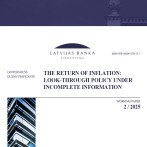This year’s average inflation could become the lowest positive annual average inflation
The annual inflation in May 2013 remained low, with the consumer prices rising 0.1% month-on-month, mainly as a result of an impact by unprocessed food prices. The persistence of negative annual inflation (-0.1%) in May was the result of a drop in fuel prices, which exceeded expectations, along with a drop in processed food prices (which contrasts to the dynamic of unprocessed food prices).
Within a month, it was mostly the prices of unprocessed food that rose (by 2.7%). Even though the average prices of foodstuffs and agricultural goods in May did not follow a trend of increase, they did reflect the rise in cereals' prices, which replaced the hitherto topical rise in prices of dairy products and which is considerably more important for Latvia, possibly pointing to a weather risk for grain harvest. The rise in unprocessed food prices primarily was expressed for horticultural products, including potatoes, which had their new harvest.
Fuel prices in May continued to go down, whereas the drop in oil prices has abated, making fuel sellers to wait before any further actions.
A small month-on-month rise in core inflation was primarily determined by service prices, for both the seasonal effects (tourism is on the rise and, along with it, the prices of hotel and catering service prices) and the impact of a possible rise in electric power prices (it may have contributed to a rise in the prices of hairdresser’s and personal care services) were worked into them. The prices of tradable goods (except those of fuel and food) rose slightly in May, for the new seasonal goods that entered the market in February-April were not yet subject to discounts. Sales are becoming topical in June as in-between season selling campaigns of wearing apparel and footwear. The impact of appreciating electric power cannot be excluded from the group of tradable goods.
Albeit the annual inflation level remained low, supply factors (cost factors, to be exact) keep marking a continuation of the period of low inflation. The estimates in the energy market are slightly more clear, for recently, after a slightly longer pause, AS "Latvijas Gāze" published its vision regarding the possible price dynamic for oil products and natural gas, an there too a drop in prices is indicated. Thus, for instance, the drop in prices of heating energy in Riga starting July will not only be determined by the new table of tariffs (possible because of the new biofuel stations) approved by the Public Utilities Commission but, very likely, also a lower sales price of natural gas. Under the impact of energy prices, this year’s average annual inflation could become the lowest positive average annual inflation since the beginning of the 1990s when data became available.
On 5 June, the European Commission published a Convergence Report in which the development of Latvian economy has received a positive evaluation, including the achievement of nominal convergence in accordance with Maastricht criteria. Meanwhile, in the context of real convergence, it will be important to maintain such an economic structure for the longer term which does not create favourable conditions for an excessive rise in prices.
Textual error
«… …»






